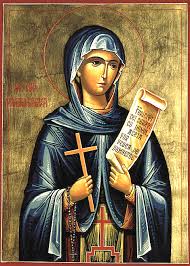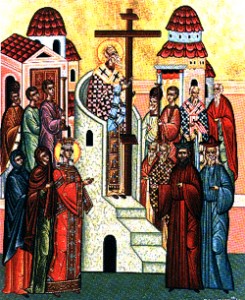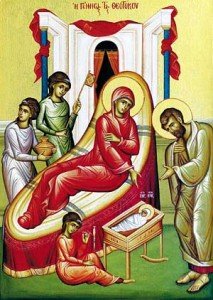On November 3, on the 19th Sunday after Pentecost we had our liturgical celebration at St. George Church. The parish Rector, Archpriest Igor Tarasov served the Divine Liturgy. Following the Gospel lesson he preached a sermon:
“In today’s Epistle lesson we are told strange words that St. Paul says the Lord Himself told him: “My grace is sufficient for you, for My strength is made perfect in weakness” (2 Cor. 12, 9). This is a paradox of our Christian faith: strength is made perfect in weakness.”
“We have to say that Christianity is full of paradoxes, of certain contradictions. We believe in God Who is ineffable, inconceivable and incomprehensible, yet we believe that we may know Him. We say that God does not belong to the world, yet He is present everywhere in the world. We believe that God is Spirit, yet He became man. We believe that God is strange to our nature, yet He acquired our own nature. We believe that God is inapproachable by men, yet we may become the partakers of His nature. In the same way St. Paul tells us that the Lord says that our strength is made perfect in our weakness.”
“When we are weak, then we are strong. This is so because our weakness makes us lean on God’s strength. There is a story of a sheep that limped and never went away from the shepherd. Someone asked about this sheep – why it limped and why it never left the shepherd’s side. The shepherd explained that that sheep was partially deaf and could not hear the shepherd’s voice. As a result, it was often in danger. Many times it had to be rescued. Finally the shepherd had to injure the sheep’s leg. Since then the sheep limped, but it stayed closer to the shepherd and it was safe. The sheep was weak, but it was strong along with the shepherd.”
“In today’s Epistle reading St. Paul tells that he was also afflicted by some “limp”. It did not come from God, but from the evil one. Paul says that he was given “a thorn in flesh, a messenger of Satan to buffet me” (2 Cor. 12, 7). Many interpreters of the Scripture guessed what kind of “thorn on flesh” St. Paul had. It could be a chronic illness, or troublesome Christians who criticized him, or hard-hearted Israelites who persecuted him, or even some sinful desire which burned St. Paul, tempted his flesh. We don’t know for sure. But what we do know is that God allowed that thorn to remain in order to keep Paul weak, “limping” at the Shepherd’s side where he would find constant strength for his weakness. And when St. Paul discovered that the true purpose of that thorn was to keep him close to the Source of power, he rejoiced. He said, “Therefore, most gladly I will rather boast in my infirmities, that the power of Christ may rest upon me” (2 Cor. 12, 9).”
“All of us, at least once in our lives, were driven into a corner from which there seemed to be no way out. If this happened, you may be sure that God allowed it, so He may come with His almighty power to deliver you. But first He wants you to discover that you are powerless and that you have to depend on Him. “When I am weak then I am strong.” If we are weak, let us admit it and accept it. Let us not pretend that we are able to do a lot of things. Accept the weakness, but not just the weakness. Accept that such feeling of weakness is needed to lead us to Him Who is the real source of strength.”
“Some young man once said to a priest, “Don’t you see, your religion is a crutch!” The priest replied, “Sure it is. But who is not limping?” Like the sheep in the story, we have to limp by the Shepherd’s side. St. Paul did and became strong.”
“St. Paul prayed three times that the thorn in flesh, his weakness might depart from him. God answered him and said, “My grace is sufficient for you…” (2 Cor. 12, 9). To all our weaknesses God may give us His help which will be enough to overcome the difficulties, to solve the problems and to feel secure. And God said to Paul that His power is made perfect in weakness. Paul discovered that God is right. In his weakness Paul leaned on Christ and found power beyond what he thought possible.”
“Let us then, dear brothers and sisters, ask our Lord that our weaknesses may drive us closer to Him and that we may find in Him the strength to follow Jesus on the path of our salvation. Let us then boast in our infirmities, that the power of Christ may rest upon us!”
Upon the Liturgy dismissal Fr. Igor reminded the parishioners of the feasts celebrated during the following week, especially the solemnity of the Icon of our Lady of Kazan on November 4th. This feast is now a national holiday in Russia because the miraculous icon of Kazan at least two times saved that country from the foreign enemies, especially in 1612 when it helped the people to free Moscow from the invaders.



